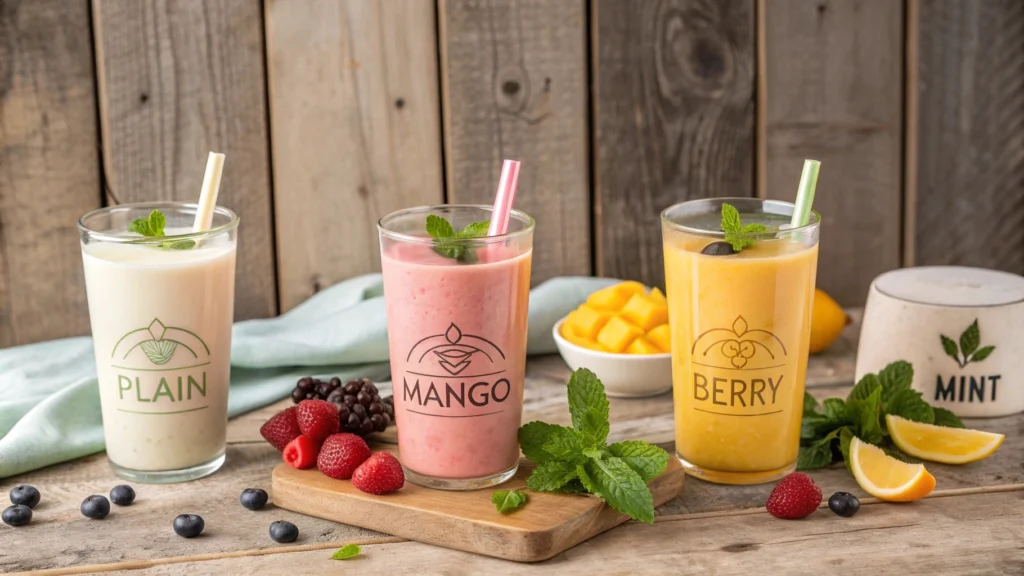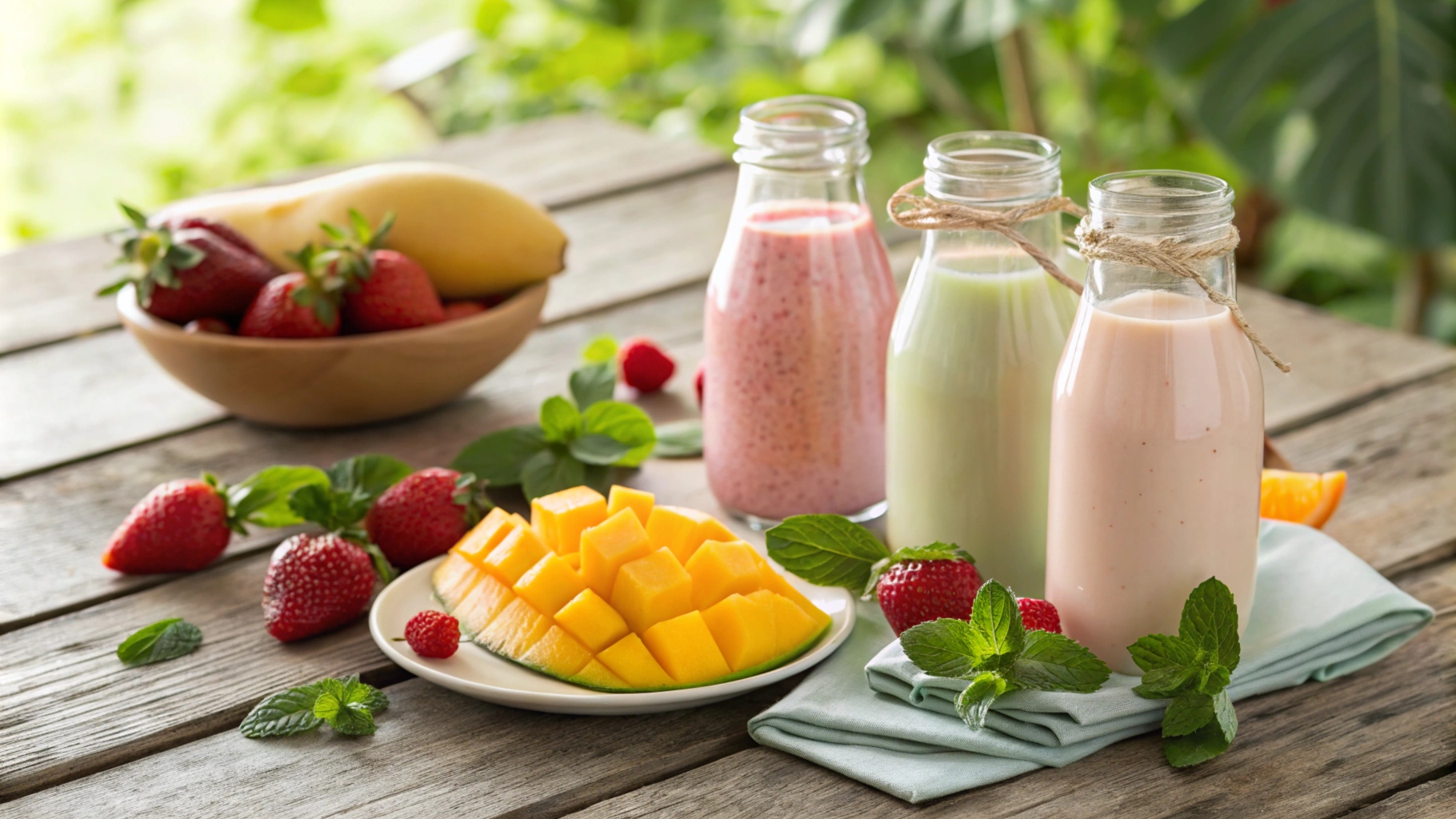Yogurt drinks have been a staple in many cultures for centuries. For instance, the lassi from India and ayran from Turkey are both iconic beverages. Moreover, these drinks are prized not just for their refreshing taste but also for their numerous health benefits. In recent years, yogurt drinks have become increasingly popular among health-conscious individuals. As a result, they are now a go-to option for those seeking a quick and nutrient-packed drink. Therefore, whether you are looking to improve digestion, explore international flavors, or make your own at home, yogurt drinks offer endless possibilities.
Differences Between Yogurt and Yogurt Drinks

While yogurt and yogurt drinks are similar, there are a few differences. For instance, yogurt is thicker and usually eaten as a snack, while yogurt drinks are thinner and often consumed as a beverage. Additionally, yogurt drinks are frequently blended with other liquids, which makes them lighter and easier to digest. Therefore, they are a convenient choice for hydration and nutrition combined.
Health Benefits
Probiotics and Gut Health
One of the standout features of yogurt drinks is their high probiotic content. Probiotics are live microorganisms that promote a healthy gut microbiome. They help balance gut bacteria, improve digestion, and may even boost immunity.
Some of the key probiotic strains commonly found in yogurt drinks include Lactobacillus acidophilus and Bifidobacterium, both known for their digestive benefits. Regular consumption of probiotic-rich yogurt drinks can help alleviate issues like bloating, constipation, and diarrhea.
Nutritional Value: Vitamins, Minerals, and Protein
Yogurt drinks are a powerhouse of essential nutrients, including:
- Calcium: Crucial for bone health and preventing osteoporosis.
- Protein: Supports muscle growth and repair, making it ideal for fitness enthusiasts.
- Vitamins B2 and B12: Boost energy levels and aid in red blood cell production.
Additionally, yogurt drinks often contain potassium and magnesium, which help maintain electrolyte balance in the body.
Weight Management and Metabolism Boost
For those looking to manage their weight, yogurt drinks can be an excellent choice. They are low in calories yet filling, thanks to their high protein content. Probiotics in yogurt drinks can also positively impact metabolism, helping the body efficiently process nutrients.
Types
Yogurt drinks come in a wide variety of flavors, textures, and regional variations. Their diversity makes them appealing to people across different cultures and preferences. From plain, unflavored drinks to rich, exotic blends, there is something for everyone.
Plain
Plain yogurt drinks are the simplest and most traditional form. These beverages typically consist of yogurt diluted with water or milk and seasoned lightly with salt. They are:
- Rich in probiotics: Ideal for promoting gut health.
- Lower in calories: Free of added sugars or artificial ingredients.
- Customizable: Serve as a blank canvas for additional flavors or toppings.
Some examples of plain yogurt drinks include lassi (unsweetened) from India and ayran from Turkey.
Flavored Yogurt Drinks
Flavored yogurt drinks appeal to those who enjoy a sweeter or more varied taste. They often include fruits, sweeteners, or spices to create a balanced flavor profile. Popular options include:
- Fruit-Based Flavors: Mango, strawberry, blueberry, or mixed berries.
- Sweet Variants: Vanilla or honey.
- Herb-Infused Blends: Mint or basil for a refreshing twist.
While these are delicious and appealing, it’s important to read labels carefully, as many commercially available flavored drinks contain added sugars or artificial flavors.
Regional Specialties
Yogurt drinks have deep cultural roots and are prepared differently around the globe, reflecting local tastes and traditions. Some noteworthy regional specialties include:
- Lassi (India): A creamy, chilled drink that can be sweet (with sugar and fruits like mango) or salty (seasoned with spices and salt).
- Ayran (Turkey): A savory yogurt drink made with yogurt, water, and salt, often served alongside meals.
- Doogh (Iran): Similar to ayran but often includes dried mint for an aromatic touch.
- Kefir (Eastern Europe): A fermented yogurt drink with a tangy taste and fizzy texture due to natural carbonation.
- Tzatziki (Greece): While traditionally a dip, this yogurt blend of cucumber, garlic, and herbs can be thinned into a refreshing drink.
How to Choose a Healthy Yogurt Drink
With so many options available, selecting the healthiest yogurt drink can be overwhelming. Here’s what to consider:
Reading Labels: Sugar and Fat Content
- Low Sugar: Look for drinks with less than 10g of sugar per serving to avoid excess calories.
- Healthy Fats: Opt for low-fat or fat-free versions if you’re watching your fat intake, but remember that full-fat varieties can be more satiating.
Organic vs. Conventional Options
Organic yogurt drinks are often free from antibiotics and hormones, making them a better choice for those prioritizing clean eating. They may also contain higher levels of omega-3 fatty acids.
Vegan and Lactose-Free Alternatives
For people with dietary restrictions, there are plant-based and lactose-free yogurt drinks available:
- Plant-Based Yogurt Drinks: Made from almond, coconut, or soy milk.
- Lactose-Free Varieties: Specially processed to remove lactose, suitable for those with lactose intolerance.
DIY Yogurt Drinks at Home
Making yogurt drinks at home is not only cost-effective but also allows you to control the ingredients and customize flavors to your liking. With simple ingredients and tools, you can whip up a variety of delicious and healthy yogurt drinks.
Ingredients Needed
Before you begin, gather the following basic ingredients:
- Yogurt: Plain or Greek yogurt for a creamy base.
- Liquid: Water, milk (dairy or plant-based), or coconut water.
- Sweeteners: Honey, agave syrup, or natural fruit purees.
- Flavor Additions: Fresh fruits, herbs (mint, basil), or spices (cardamom, cinnamon).
- Optional Enhancements: Nuts, seeds, or a dash of vanilla extract.
Step-by-Step Recipes
Recipe 1: Classic Plain Yogurt Drink
This refreshing drink is a great starting point for DIY enthusiasts.
- Combine 1 cup of plain yogurt with 1 cup of cold water.
- Add a pinch of salt and whisk or blend until smooth.
- Serve chilled in a glass.
Recipe 2: Mango Lassi
A sweet and creamy yogurt drink perfect for summer.
- Blend 1 cup of yogurt with ½ cup of mango puree.
- Add 2 tablespoons of honey or sugar for sweetness.
- Mix in ½ cup of milk or water for a thinner consistency.
- Garnish with a sprinkle of cardamom powder and serve cold.
Recipe 3: Minty Ayran
A savory and cooling option inspired by Turkish cuisine.
- Combine 1 cup of yogurt with 1 cup of cold water.
- Add a pinch of salt and 2 teaspoons of chopped fresh mint.
- Blend well and serve immediately.
Heading 4: Recipe 4: Berry Smoothie Yogurt Drink
A nutrient-packed drink that’s perfect for breakfast or post-workout.
- Blend 1 cup of yogurt with 1 cup of mixed berries (blueberries, strawberries, raspberries).
- Add ½ cup of almond milk or coconut water.
- Sweeten with honey or a ripe banana, if desired.
Storage and Shelf Life
- Refrigeration: Store homemade yogurt drinks in airtight containers and refrigerate them immediately after preparation.
- Shelf Life: Consume within 2–3 days for the best flavor and nutritional quality.
- Freezing: Yogurt drinks can be frozen in popsicle molds for a refreshing summer treat.
Yogurt Drinks for Different Lifestyles
For Fitness Enthusiasts
Yogurt drinks are an excellent pre- or post-workout snack, thanks to their high protein content. Add whey protein powder or chia seeds for an extra boost of energy and muscle recovery.
On-the-Go Meals
For busy individuals, yogurt drinks serve as a quick, nutritious breakfast or snack. Prepare them in portable bottles to carry to work or school.
Kids and Family Options
Create fun and healthy yogurt drinks for kids by using their favorite fruits and colorful toppings like sprinkles or crushed nuts. You can also make smoothie bowls with yogurt drinks as a base, topped with granola and fruits.
Common Myths and Facts
Yogurt drinks have gained significant popularity, but they’re often surrounded by myths and misconceptions. Let’s debunk these myths and uncover the facts behind this beloved beverage.
Myth 1: All Yogurt Drinks Are Healthy
Fact: While yogurt drinks are generally nutritious, not all are created equal. Many commercial varieties are loaded with added sugars, artificial flavors, and preservatives, which can diminish their health benefits. To ensure you’re choosing a healthy option, look for drinks with minimal ingredients and no added sugars.
Myth 2: Yogurt Drinks Always Aid Digestion
Fact: The presence of probiotics in yogurt drinks can support gut health, but not all yogurt drinks contain live cultures. Heat-treated or pasteurized varieties often lose their probiotic content. For digestive benefits, choose yogurt drinks labeled with “live and active cultures.”
Myth 3: Yogurt Drinks Are a Complete Meal Replacement
Fact: While yogurt drinks are rich in nutrients, they’re not always sufficient as a full meal replacement unless fortified with additional ingredients like oats, nuts, or seeds. Pairing them with a light snack or using them as part of a balanced diet is a better approach.
Myth 4: Yogurt Drinks Are Only for Gut Health
Fact: Yogurt drinks provide a range of benefits beyond gut health. They are an excellent source of protein, vitamins, and minerals, making them ideal for supporting bone health, boosting energy, and improving overall nutrition.
Myth 5: Yogurt Drinks Are Dairy-Exclusive
Fact: Vegan yogurt drinks made from almond, soy, or coconut milk are widely available and equally nutritious. These plant-based options are perfect for those avoiding dairy due to allergies, lactose intolerance, or lifestyle choices.
Best Brands Worldwide
Exploring the best brands of yogurt drinks can help you find options that suit your taste and nutritional preferences.
Popular International Brands
- Yakult (Japan): A pioneer in probiotic drinks, Yakult offers a tangy and sweet yogurt drink packed with Lactobacillus casei Shirota.
- Danone (France): Known for its Actimel range, Danone produces yogurt drinks fortified with vitamins and live cultures.
- Chobani (USA): Offers Greek yogurt drinks that are high in protein and low in fat, with a variety of flavors.
Local Favorites by Region
- India: Amul and Mother Dairy are popular for their lassi and flavored yogurt drinks.
- Turkey: Pınar and Sütaş lead the market with savory ayran.
- Middle East: Brands like Almarai produce high-quality laban and doogh.
Niche and Specialty Brands
Smaller brands like Siggi’s (known for Icelandic skyr drinks) and Forager Project (vegan yogurt drinks) cater to unique preferences and dietary needs.
Culinary Uses of Yogurt Drinks
Yogurt drinks are not just for sipping they’re also a versatile ingredient in cooking.
As a Base for Smoothies
Use plain yogurt drinks as a base for smoothies, blending them with fresh fruits, leafy greens, or protein powders for a nutritious and flavorful beverage.
Ingredient in Sauces and Marinades
Yogurt drinks can be used to create creamy sauces or as a tenderizing marinade for meats. For example:
- Tzatziki Sauce: Combine yogurt drink with cucumber, garlic, and dill.
- Marinade: Mix yogurt drink with lemon juice and spices for marinating chicken or lamb.
Pairing with Meals
In many cultures, savory yogurt drinks are enjoyed as a complement to spicy or rich dishes. Examples include:
- Ayran with Kebabs: A refreshing palate cleanser.
- Doogh with Rice Dishes: Balances the flavors of aromatic Middle Eastern cuisine.
Potential Drawbacks of Yogurt Drinks
While yogurt drinks are nutritious and versatile, they may pose certain challenges for some consumers. It’s essential to be aware of these drawbacks to make informed choices.
High Sugar Content in Some Varieties
Many commercially available yogurt drinks are sweetened to enhance their flavor, often containing significant amounts of added sugar. Excessive sugar intake can lead to weight gain, dental problems, and increased risk of chronic diseases such as diabetes.
Solution: Opt for unsweetened or naturally sweetened options. Better yet, make your own yogurt drinks at home to control the sugar content.
Lactose Intolerance and Allergies
For individuals who are lactose intolerant or allergic to dairy, consuming traditional yogurt drinks can cause digestive discomfort, including bloating, cramps, and diarrhea.
Alternatives:
- Lactose-free yogurt drinks, which retain the taste and texture without the lactose.
- Plant-based yogurt drinks made from almond, soy, or oat milk.
Overconsumption Risks
While yogurt drinks are healthy in moderation, overconsumption can lead to:
- Caloric Surplus: Particularly in flavored or sweetened versions.
- Imbalance in Gut Flora: Excessive probiotics can sometimes upset the gut microbiome.
Tip: Stick to recommended serving sizes, typically around one cup per day for most adults.
How Yogurt Drinks Are Made: From Farm to Bottle
The production of yogurt drinks is an intricate process that ensures consistency, quality, and safety.
Heading 3: Fermentation Process
- Milk Selection: High-quality milk is selected, pasteurized, and homogenized.
- Adding Cultures: Live bacterial cultures such as Lactobacillus bulgaricus and Streptococcus thermophilus are introduced to ferment the milk into yogurt.
- Thinning the Yogurt: The thick yogurt is blended with water, milk, or plant-based liquids to create a drinkable consistency.
Flavoring and Packaging
- Flavor Enhancements: Natural or artificial flavors, fruits, and sweeteners are added during blending.
- Packaging: The yogurt drink is sealed in hygienic, eco-friendly containers to preserve freshness and prevent contamination.
Sustainability and Yogurt Drinks
As the demand for yogurt drinks grows, sustainability becomes an important consideration.
Eco-Friendly Packaging Options
Many brands are transitioning to sustainable packaging solutions, such as:
- Recyclable bottles and cartons.
- Plant-based or biodegradable packaging materials.
Supporting Sustainable Dairy Farming
Consumers can look for brands that support:
- Ethical dairy farming practices, including proper treatment of animals.
- Reduction of carbon emissions in production.
yogurt drinks into your meals, snacks, or post-workout routines for a refreshing and nutritious boost.
Explore related recipes, like the Citrus Infusions Lemon Ricotta Pancakes for a perfect pairing!

